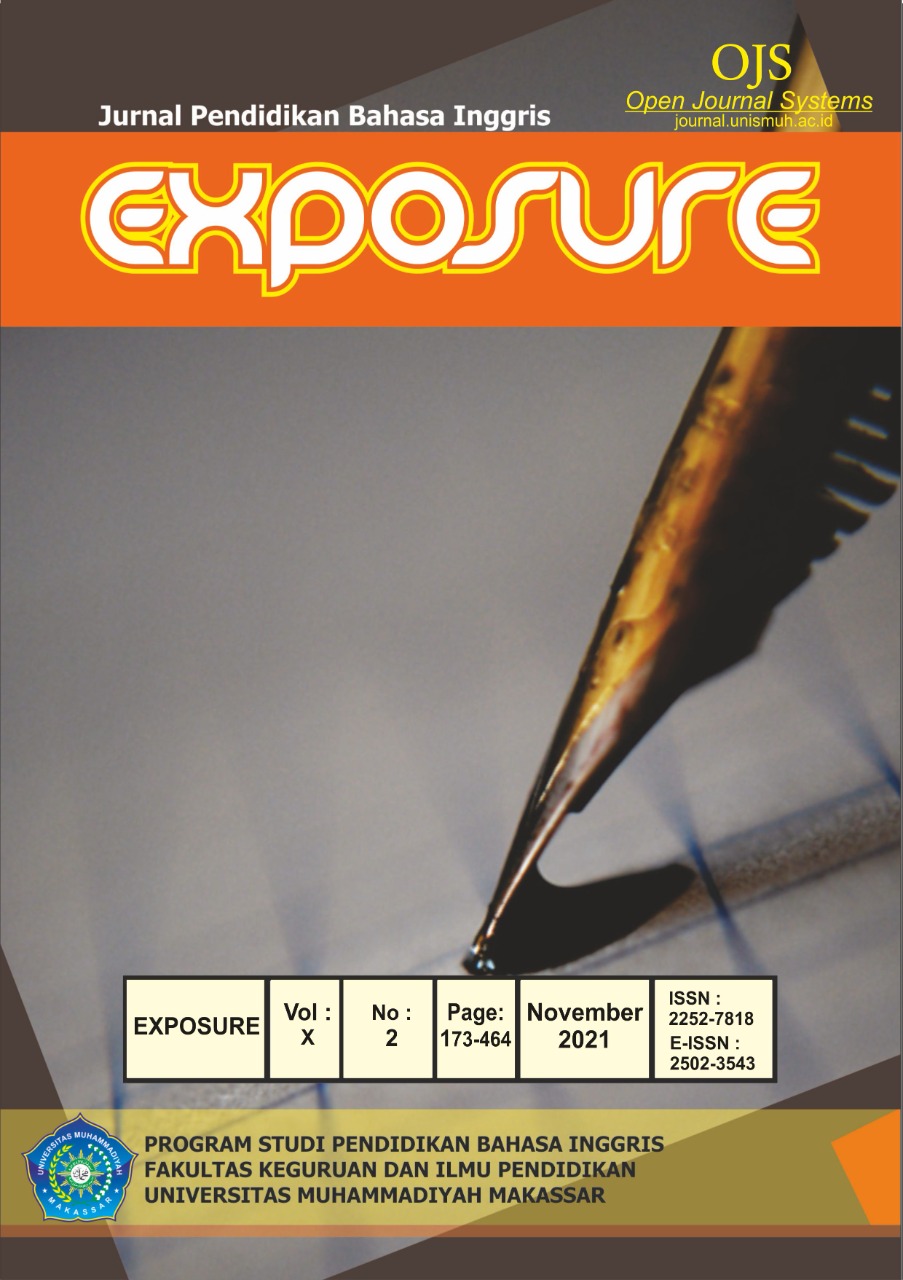QUIZIZZ-ASSISTED SERIOUSLY PERUSING IN ELT CLASSROOM: EFL AUXILLARY UNDERSTUDIES ENCOUNTRES
Keywords:
Students experience, Quizizz, Intensive Reading, ELTAbstract
This research reports the findings of action research on Students’ Experience using Quizizz-Assisted on Intensive Reading in ELT Classsroom. The aim of this research is to capture students’ experience towards using Quizizz-Assisted on intensive reading in ELT classroom. This research was conducted at one of junior high school in Cikarang in the academic year 2020/2021. The participants of this research were five students and an English teacher. This research used qualitative. The data collection obtained through observation and interview. This research found that Quizizz helps students motivation in learning Reading in ELT classroom. And also helped the students to build fun teaching reading, make the students interest to gain more experience to teaching intensive reading in classroom. The abstract should be clearly written and readily comprehensible to the broad readership. It should provide a concise summary of the objectives, methodology (including the species studied), key results, and major conclusions of the study. It should be written in complete sentences, without subheadings. And it provides two languages (Bahasa Indonesia and English). Line and paragraph spacing is 1.0 with font size 11. Write abstract by using times new roman and italiced your text. Keywords: Students experience, Quizizz, Intensive Reading, ELTReferences
Andrés, I. C. (2020). Enhancing Reading Comprehension through an Intensive Reading Approach. HOW, 27(1), 69-82.
Ary, et al. (2010). Introduction to Research in Education. USA: Wadsworth: Cengage Learning.
Basuki, Y., & Hidayati, Y. (2019). Kahoot! or Quizizz: the Students’ Perspectives. In ELLiC 2019: Proceedings of the 3rd English Language and Literature International Conference, ELLiC, 27th April 2019, Semarang, Indonesia (p. 202). European Alliance for Innovation..
Braun, V., & Clarke, V. (2006). Using thematic analysis in psychology. Qualitative Research in Psychology, 3(2). Pp. 77-101. ISSN 1478-0887.
Burns, A.(2010). Doing Action Researchin English Language Teaching: A Guidefor Practitioners, p.2. New York: Routledge.
Chaiyo, Y., & Nokham, R. (2017). The effect of Kahoot, Quizizz and Google Forms on the student's perception in the classrooms response system. In 2017 International Conference on Digital Arts, Media and Technology (ICDAMT) (pp. 178-182). IEEE.
Creswell, J. W., & Creswell, J. D. (2017). Research design: Qualitative, quantitative, and mixed methods approaches. Sage publications.
Fulmer, S. M., & Frijters, J. C. (2009). A review of self-report and alternative approaches in the measurement of student motivation. Educational Psychology Review, 21(3), 219-246.
Gall, M. D., Brog, W. R. & Gall, J. P.,(2003). Education Research An Introduction Seventh Edition. New York: Allyn & Bacon.
Göksün Derya Orhan & Gülden Gürsoy (2019). Comparing success and engagement in gamified learning experiences via Kahoot and Quizizz. Computer & Education. DOI: 10.1016.
Kemmis,S.(2009).ActionResearchasaPractice basedPractice.EducationalAction Research,17(3),463–474.
Kemmis, S., McTaggart, R.,&Nixon, R.(2014). The Action Research Planner Doing Critical Participatory action Research.Singapore:Springer.
Koay, Jeremy. What Is Intensive Reading?. Retrieved June 5, 2021, from https://www.edumaxi.com/what-is-intensive-reading/
Mart, C. (2015). Combining extensive and intensive reading to reinforce language learning. Journal of Educational and Instructional Studies in the World, 5(4), 85-90.
Macalister, J. (2011). Today’s teaching, tomorrow’s text: Exploring the teaching of reading. ELT Journal, 65(2), 161-169.
Miles, M. B., & Huberman, A. M. (1994). Qualitative Data Analysis: An Expanded Sourcebook. Journal of Environmental Psychology. 14(4). 336–337. DOI: 10.1016/s0272-4944(05)80231-2.
Mohseni Takaloo, N., & Ahmadi, M. R. (2017). The effect of learners’ motivation on their reading comprehension skill: A literature review. International journal of research in English education, 2(3), 10-21.
Downloads
Additional Files
Published
Issue
Section
License
Authors who publish with this journal agree to the following terms:
In order to assure the highest standards for published articles, a peer review policy is applied. In pursue of the compliance with academic standards, all parties involved in the publishing process (the authors, the editors and the editorial board and the reviewers) agree to meet the responsibilities stated below in accordance to the Journal publication ethics and malpractice statement.
Duties of Authors:
- The author(s) warrant that the submitted article is an original work, which has not been previously published, and that they have obtained an agreement from any co-author(s) prior to the manuscript’s submission;
- The author(s) should not submit articles describing essentially the same research to more than one journal;
- The authors(s) make certain that the manuscript meets the terms of the Manuscript Submission Guideline regarding appropriate academic citation and that no copyright infringement occurs;
- The authors(s) should inform the editors about any conflict of interests and report any errors they subsequently, discover in their manuscript.
Duties of Editors and the Editorial Board:
- The editors, together with the editorial board, are responsible for deciding upon the publication or rejection of the submitted manuscripts based only on their originality, significance, and relevance to the domains of the journal;
- The editors evaluate the manuscripts compliance with academic criteria, the domains of the journal and the guidelines;
- The editors must at all times respect the confidentiality of any information pertaining to the submitted manuscripts;
- The editors assign the review of each manuscript to two reviewers chosen according to their domains of expertise. The editors must take into account any conflict of interest reported by the authors and the reviewers.
- The editors must ensure that the comments and recommendations of the reviewers are sent to the author(s) in due time and that the manuscripts are returned to the editors, who take the final decision to publish them or not.
Authors are permitted and encouraged to post online a pre-publication manuscript (but not the Publisher’s final formatted PDF version of the Work) in institutional repositories or on their Websites prior to and during the submission process, as it can lead to productive exchanges, as well as earlier and greater citation of published work (see The Effect of Open Access). Any such posting made before acceptance and publication of the Work shall be updated upon publication to include a reference to the Publisher-assigned DOI (Digital Object Identifier) and a link to the online abstract for the final published Work in the Journal.

